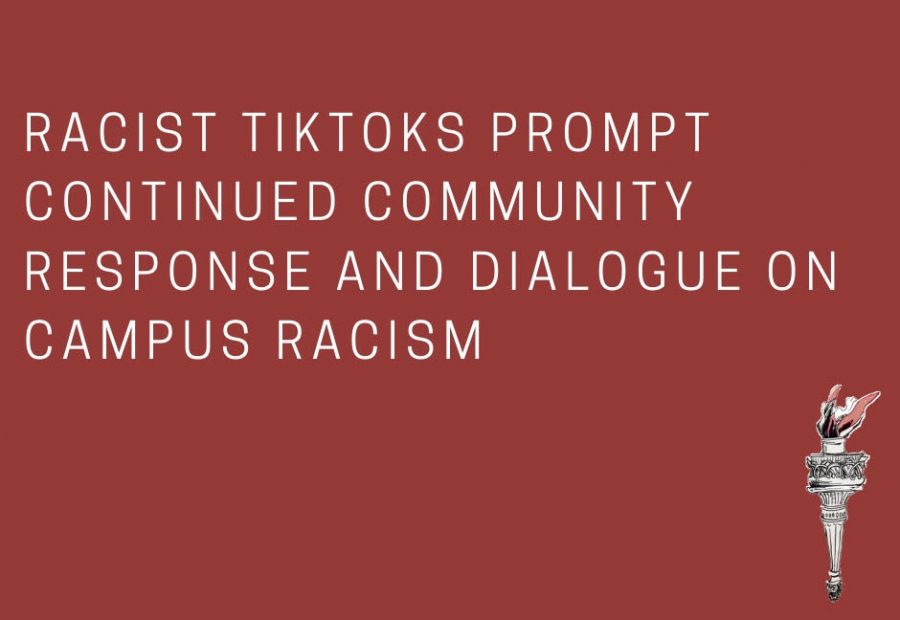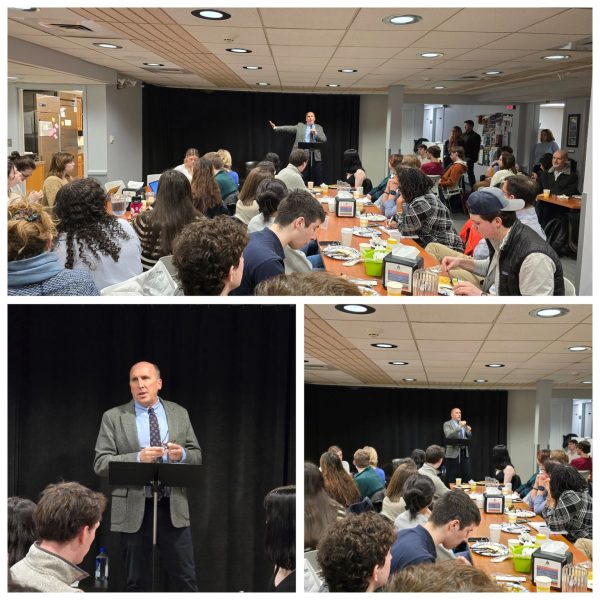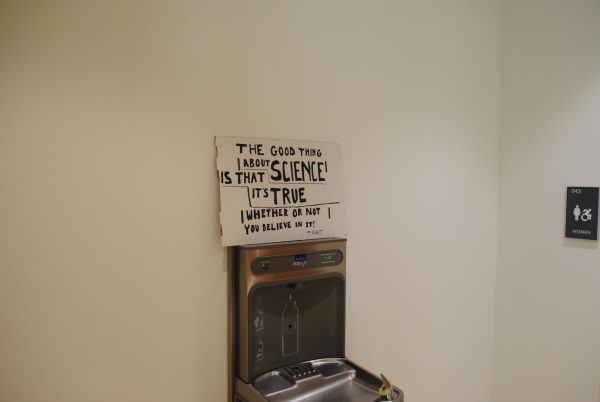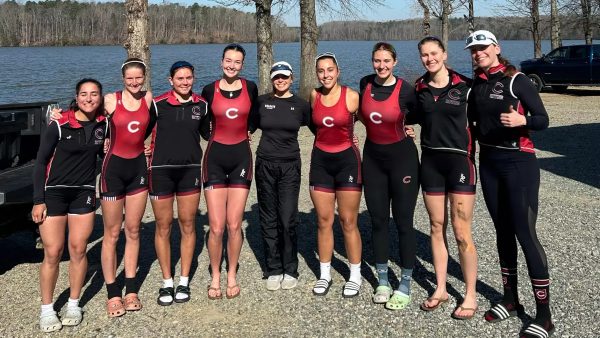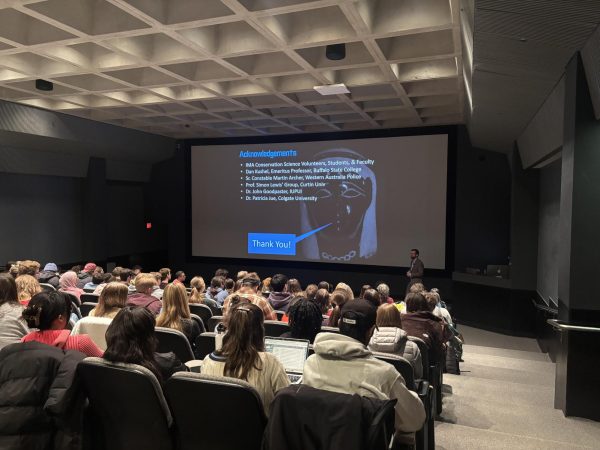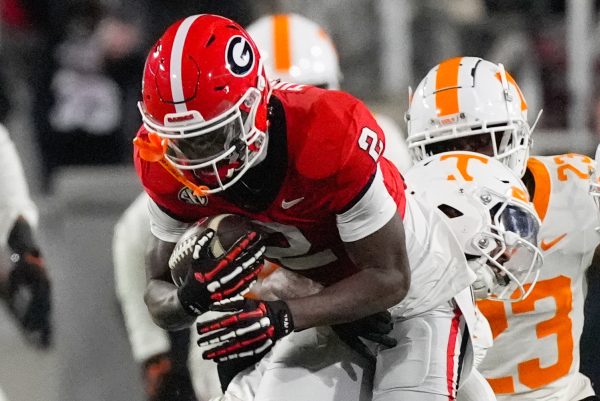Racist TikToks Prompt Continued Community Response and Dialogue on Campus Racism Amid EGP Investigation
After the University revoked the admission of an incoming first-year and launched an investigation into two current students following the spread of their racist TikToks, Colgate student organizations, offices and individuals continue to respond and denounce their actions. Amid national conversations and outrage of institutionalized racism, many responses have addressed these videos in the context of deeper legacies of racism on Colgate’s campus.
University President Brian Casey responded to the videos in an email on Tuesday, June 23, announcing the investigation and the revoke of the incoming student’s acceptance. The results of the investigation, according to Casey, will be shared upon conclusion of the investigation and to the extent allowed under student privacy laws.
“In a time when we have seen people across the world rightfully outraged by the recent killings of George Floyd and countless other black men and women and we see nearly every institution in the country looking at the nature and effect of systemic racism, these videos evince a level of cruelty that is staggering,” Casey wrote. “When faced with a combination of ignorance and cruelty, know what this community values and how we support and defend those values.”
Vice President of the Black Student Union (BSU) junior Sophia Beresford said she appreciates the administration’s quick and effective response that showed students of color he was on their side. Given the first individual was a legacy, Beresford wasn’t expecting such a strong response and thinks that national protests played a key role.
“[Not that] the administration would have just ignored it, but I feel like since it happened when it happened they had to respond very quickly and very effectively,” Beresford said. “College students are known for protesting and rebelling anyways, but they know that, especially right now, we were not going to let them just sweep this under the rug. I’m glad that we were able to, in a sense, take advantage of the climate and get them to take care of the situation.”
Associate Vice President for Campus Safety, Emergency Management and Environmental Health and Safety Dan Gough confirmed that Campus Security opened a case report upon receipt of the report. Assistant Director for Investigations Val Brogan and Associate Provost for Equity and Diversity and Title IX Coordinator Lyn Rugg are heading the investigation.
Gough said that in an investigation into social media, the investigation team has less access to valuable resources and techniques, such as on-site interviews, video surveillance, card access and network use logs.
According to Rugg, investigations into incidents of harassment fall under the University’s Equity Grievance Process (EGP). While the EGP policy doesn’t explicitly include behavior on social media under EGP guidelines, Rugg said actions on platforms like TikTok fall within the realm of communication-based harassment that can implicate EGP violations.
“EGP applies to both the individual or group targeted by the harassment or discrimination and to third parties who experience hostile environment as a result of the incident or behavior,” Rugg said. “Behavior that occurs off campus can be addressed through EGP when that off-campus behavior impacts our on-campus community and creates a hostile environment for members of our community.”
The University’s ability to publicly share the results of individual EGP investigations is restricted by the Family Educational Right and Privacy Act (FERPA), which will govern what will be shared with the community regarding the status and outcome of the investigation into the TikTok made by two current students, both of whom did not respond to requests for comment.
“FERPA affords all students a great deal of privacy with respect to their educational records,” Senior Advisor to the President and Assistant Dean for Administrative Advising Christopher Wells said. “Any outcome from EGP proceedings can only be shared in ways that do not violate that law, which restricts sharing details of individual students’ records without their consent.”
Beresford said that BSU’s main focus has been supporting the Black individual who was featured in one of the TikToks without their knowledge through the EGP process. She said that while the individual’s privacy will be a priority, any information they are willing to share will be important public information for the community.
“Hypothetically if these two [individuals] get expelled or something, I think it needs to be known because it’s the University showing not only current students but prospective students that we don’t tolerate this kind of behavior here,” Beresford said. “Some people might think that doing something like a TikTok is a non-sequitur and is insignificant, but it does matter.”
According to Rugg, the conduct for accepted and incoming students, as was the case for the incoming student whose racist TikTok went viral, is generally handled directly through the Office of Admission.
Assistant Dean of Admission Keaton Hain said members of the Office of Admission were shocked and disappointed by the TikToks. In evaluating the integrity of potential students, Hain explained that although each application is reviewed by at least three admission officers, catching cues of discrimination or racism by an applicant is extremely difficult.
“Anything reflected in an application that would, if committed by a current student, clearly violate our University’s standards for diversity and inclusion, be it related to religion, gender, race, sexual orientation or other protected category, would be grounds for rejection,” Hain said. “However, outward signs of racism and bigotry are incredibly rare to see in an application.”
Senior Admission Intern Ellie Kucera echoed this sentiment, addressing the materials required in Colgate’s application.
“Maybe the teacher recommendations [are an exception], but otherwise it’s pretty easy to put on a good face for that application and have it kind of slip through the cracks,” Kucera said. “Maybe that’s a clue that the entire application process should be revamped.”
Kucera is also a lead orientation link, overseeing the staff of first-year and transfer links. She said the same difficulty of recognizing problematic students exists during first-year orientation.
“It’s hard, because our initial interactions with those students are in their first week of college. I don’t think that students oftentimes are their truest selves in those kinds of orientation settings,” Kucera said.
Kucera said that Link Staff has discussed implementing further training for conversations about racism and bias, and also feels the staff will continue to engage in discussions about race and educate themselves.
Panhellenic Council President Cam Campbell is working to prevent the current students under investigation from Panhellenic recruitment in the fall, a task proving bureaucratically challenging. Initially, Campbell and her team wanted to introduce a new rule to their bylaws allowing Panhellenic to disqualify students for recruitment should they violate the Panhellenic Code of Ethics, which their advisor informed them is not allowed — the only restriction on recruitment is GPA.
“I don’t want members within the Panhellenic community already to have to interact with these women on the first night of recruitment,” Campbell said. “That has never been done before.”
Since she likely cannot stop the individuals from registering for recruitment, Campbell anticipates she will have to use other measures to prevent these individuals from attending the first night of recruitment by using Panhellenic’s existing judicial process in a new way. However, Campbell is continuing to research the possibility as the Panhellenic council prepares to push back on their restrictions by meeting with Director of Fraternity and Sorority Advising Amber Decker and Colgate’s National Panhellenic Council area advisor.
“I hope an event never happens like this again, but if it does I want to have a procedure in place where someone can be removed from recruitment if they make other members of the community feel uncomfortable,” Campbell said.
In the immediate future, she said she will work with individual chapters on increasing accountability by improving conduct procedures, as well as work on mandatory bias training to start transforming the culture within sororities.
“I think the best way to transform a community is to make sure the people that are joining the community are good people. You can’t really change a community when you have that type of behavior coming through,” Campbell said. “It’s one thing for you to extend an offer to join Colgate’s community, like the offer of acceptance and it’s the same thing to offer a [sorority or fraternity] bid to someone. It’s a much more tricky process once that person is a member of the community.”
Following the videos’ initial circulation, many students and groups took swift action prior to the university’s revoke of the incoming student’s acceptance the next day. Junior Sally McGee championed one of those efforts, starting a Change.org petition calling for the revoke of the incoming student’s admission that gained over 2,500 signatures.
“I kind of felt like there needed to be a single platform where everyone could have one place to come together and have solidarity,” McGee said. “If we’re all going about it individually in the comments section that’s great, but it’s not as powerful.”
While the University had begun investigating both TikToks before the administration was aware of the petition, Wells said the role of student activism cannot be understated.
“It has always been my strongly-held opinion that student activism has been and will continue to be an important part of higher education, and of positive change in the world,” Wells said.
Junior Keilani Blas drafted the Colgate Student Coalition’s (CSC) email template to members of University administration calling to revoke of the incoming student’s acceptance and hold the current students accountable. Blas said the email template, accessed by over 1,000 unique visitors, was a collaborative effort by the CSC media team and the coalition at-large to provide the student body a simple resource to demand action by the administration.
“We chose the email format because we knew we could get a lot of students to send it,” Blas said. “We want the faculty and administrators to feel what we feel — to feel our dedication and passion. We want them to know we are strong in our stance that Colgate has no room for this. We want actions taken.”
Blas said she feels revoking the individual’s offer of admission was the right decision, and hopes the students under investigation are also removed from campus.
“The Colgate community has an obligation to protect their Black students,” Blas said. “[The current students that created the TikTok] do not deserve the benefit of the doubt, or a second chance…they had the privilege of a formal education on systemic racism and microaggressions, yet they still posted a video dehumanizing an intelligent, Black [student] on campus.”
Kappa Kappa Gamma president senior Sasha Balasanov also drafted a letter to email to members of the administration in response to the TikToks. Collaborating with the executive council and the chapter at-large, Balasanov said it was extremely important that every member be able to review the letter, which demanded that the University revoke the acceptance of the incoming first-year and called on the administration to stand by their statements condemning systemic racism and police brutality in response to the murders of George Floyd, Breonna Taylor and many others.
“If we as an institution are aiming to better ourselves and address the cycle of racism at Colgate, rescinding [this individual’s] acceptance is an important step that must be taken to keep the trust, comfort, equality and safety of Colgate students” read the letter. “By revoking [their] admission, you demonstrate not only to the Colgate community but to the country as a whole that we do not tolerate such racist acts and that you stand by your previous statement as an institution.”
Although Balasonov originally planned to use the template created by the CSC, not craft their own letter, she then realized she had a duty as a student leader on campus.
“I think it’s important to use that position and advocate for the women that elected our council and gave them a voice specifically as well as do our best for the rest of the Colgate community, not just Kappa. We’re not obviously an isolated community” said Balasonov.
Despite this, Wells said the EGP process cannot account for public discourse in their investigation of student conduct.
“We need to apply our University’s code of conduct standards evenly, regardless of public outcry,” Wells said.
As the fall semester approaches, many students have started thinking about how to move forward from this incident and build on its momentum. Beresford said that CSC has been thinking about how to ensure all the clubs and organizations that have signed on to be a partner are doing individual work that aligns with the Coalition’s mission. Some initial ideas they have are creating training for all affiliated clubs’ Coalition representatives or meetings to discuss each group’s progress and planning.
Beresford said that moving forward, affinity groups, cultural and religious clubs like BSU will need more support in hosting lectures and speakers on campus. She added, however, that the responsibility of educating students about race and racism should not continue to fall on students and faculty of color, responding to comments she and others have encountered suggesting that the University should embrace and educate students like those in the TikToks rather than turning them away.
“If we’re talking about a class that is going to so-called fix their opinions, these would be [Africana and Latin American Studies] classes, anthropology, sociology classes which, a lot of those are taught by faculty of color. It’s not faculty of color’s responsibility to teach [students] how to not be racist. Meanwhile, what are they doing to the POC community on campus, what damage are they bringing to us while we’re supposed to be teaching them,” Beresford said. “They need to go out into the world and learn some things on their own. We shouldn’t have to put up with people like that while we’re trying to learn. We can’t be people’s parents and be students at the same time.”
Many other student groups are writing letters to administration and having internal conversations about the incidents and racism more broadly on campus, including Phi Kappa Tau. Recruitment and Diversity, Equity and Inclusion (DEI) chair for the fraternity junior Thomas Dunia said that the racist video made by current students made him think more deeply about the potential sophomores that are rushing in the fall. He said that as an organization, Phi Tau felt they must take part in condemning and demanding accountability for racist acts and are drafting a letter to be sent to Casey.
“We as a fraternity are trying to obviously do better in regards to sticking up for minorities. We can’t just bring in people of color and then expect the structure of the fraternity on its own as well to stay the same,” Dunia said.
Dunia described his own feelings of isolation as a Black man in Greek life, emphasizing the importance of conversations about race across academic and social spaces on campus.
“I feel like conversations really go a long way and the conversation starts in the classroom and it leads out, obviously, to social events and gatherings outside of the classroom but it doesn’t start unless it’s brought up somewhere,” Dunia said. “It needs to be an obligation for everyone to take a course in relation to race.”
As DEI chair, Dunia shared ideas to increase inclusivity in Phi Tau and in Greek Life such as mixing with other organizations outside of Greek Life like SORT and Brothers, increasing scholarships and playing a greater variety of music during social events.
The incidents, particularly by the formerly incoming student, also prompted response from members of the class of 2024. First-year Cyril King called out the student and started a dialogue about the incident within the 2024 GroupMe. Despite feeling unseen in prior attempts to engage with the group as a Black student, he felt the need to start an important conversation.
“These issues are not [ones] that people can be silent on. I know that with silence and with people not being educated — with people not knowing what’s going on within our own community or even the world — I think that’s dangerous. I know there’s urgency with having people understand,” King said.
While the individual who posted the video didn’t address their actions, King felt the conversation opened people’s eyes to the reality of racism in the Colgate community.
“[The individual] of course saw us bringing up this issue, saw us talking about the histories and oppressions that minorities have faced in America and was still silent,” King said. “Looking at racism is in our own community, that’s what made people stop and think, this isn’t just an issue in the world, it’s in our own communities and what can we do to make sure that people are safe, to make sure that people are seen to make sure that people are comfortable? And think that’s what made people start to have conversations and want to learn.”
Within the Office of Admission, Hain said staff are taking steps to make the admissions process more equitable, in part through working with Associate Provost for Equity and Diversity Maura Tumulty to reduce implicit bias in their admission review process. The University also announced last fall that Colgate will begin partnering with Questbridge beginning with the class of 2025, a national nonprofit that connects the nation’s most exceptional, low-income youth with leading colleges and universities.
“We hope this new relationship will lead to greater numbers of applications from highly qualified students of color, and we hope to leverage additional networks in the future to help move the needle toward even greater diversity within our student population,” Hain said.
Wells said that while efforts to make Colgate more inclusive are underway through initiatives outlined in the University’s DEI plan released last fall, these actions alone will not combat racism on campus.
“More will be needed if we are to live up to our values by actively combating the racism that can keep [Black] students and other students of color from being able to make the most of their time at Colgate and undermines the experience they deserve to have here. Unfortunately, the [University] cannot guarantee that racism will never rear its ugly head on campus again, but we can commit to proactively educating the community on our values and to responding as well and as humanly as possible when racist incidents take place,” Wells said.
King said despite the incidents, he’s found silver linings in connecting with the community and feels optimistic about change.
“The one good thing that we can take from this is that everyone’s talking about change right now,” King said. “Coming into this community, I know that there are people who support me but also, I don’t really see myself represented in forms of power or in the student body. But being in the Black Student Union, being in the POC group [and] being in CSC, I know that I’m seen and there will be efforts to make sure that people of color feel safe on campus and this will not happen again, exactly as the [CSC] document said: we will not reset, period.”

Kirby Goodman is a senior from Minneapolis, Minnesota concentrating in peace and conflict studies with a minor in political science. She's previously served as...
Kelsey McGeough is a senior from Weston, Massachusetts concentrating in English. She’s previously served as a news editor and staff writer. She is involved...
Emily Rahhal is a senior from Los Angeles, California double concentrating in Middle Eastern and Islamic Studies and Religion. She has previously worked...


